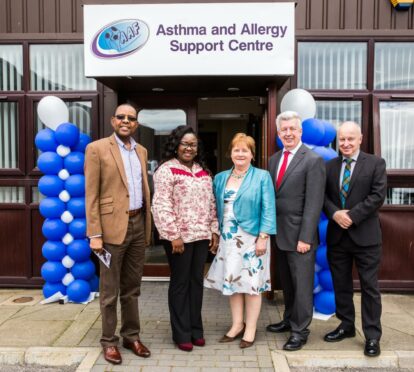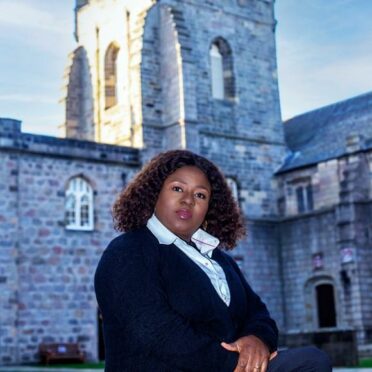The founder and chief executive of the Asthma and Allergy Foundation has said she will be a “working rector” at Aberdeen University.
Martina Chukwuma-Ezike was named rector yesterday, taking over from Green politician Maggie Chapman.
And now, in her first interview since, she has spoken about her life leading up to the creation of the charity, including the dramatic moment a medical emergency changed her future, and what happened afterwards.
She had been working at the Nigerian National Petroleum Corporation in the mid-2000s, and hoped to use a Master’s degree from the university to become a department head.
But a week before she left, having said her goodbyes to her colleagues, Mrs Chukwuma-Ezike’s life changed drastically.
“When I left the office, I was in close contact with people who wore different perfumes and very strong fragrances, and being asthmatic I started struggling before I left the office,” she said.
“But by the time I got to the car park, before I could get to my car I collapsed.”
Luckily, a security guard spotted her struggling and knew she had asthma, so quickly sent for help.
She said: “By the time I was taken to the nearest clinic, I had already passed on and I was pronounced dead. I was told by the doctor I was clinically dead for 10 minutes.
“But by miracles and luck, I came round.
“They’d covered me in the white sheet and left me in the theatre where they were trying to administer oxygen.”
A nurse heard her sneeze from another room, rushed back into the theatre and found a very faint pulse. The medical team then gave her more oxygen, and she came around.
A second chance
Suddenly, asthma became central to her life – and all the harder to ignore after moving from the heat of Nigeria to the cold of the north-east.
Severe attacks – she was later diagnosed with brittle asthma, a particularly harsh form of the condition – soon became a painfully regular occurrence, and her frequent trips to A&E made it difficult for Mrs Chukwuma-Ezike, then 27 years old, to study.
Out of frustration, she organised a meeting with Neil Churchill, the chief executive of charity Asthma UK at the time, and said a service was desperately needed up in Aberdeen.
However, she was told he would not be able to set one up.
“I came back and went to my GP and I said, ‘Can’t somebody just do something?’ and he said, ‘Martina, if nobody else is going to do anything you go do it.’
“So I did.”
Asthma Foundation formed
In 2009, she started holding support workshops for people with asthma at the Old Machar medical practice on the city’s King Street, and recruited a nurse to help identify what causes the symptoms and give advice on how to deal with the condition.
She said: “The first workshop had about eight, the next had over 20, and at the third workshop we found that asthma affected people differently.
“The elderly people had their own challenges, as did young people my age and children, so they split us into groups, and that is what led to what we now have as the Asthma and Allergy Foundation.
“Ever since we started the requests really haven’t stopped.”
The foundation was granted charity status on November 17 2011, and in the ten years since it has helped people living with asthma across the country to manage their symptoms.
Mrs Chukwuma-Ezike, now 40, says she is a case study herself, with her severe condition “very well controlled” thanks to the work she has been a part of.
Eventually the workshops outgrew the original space, so the Asthma and Allergy Support Centre was opened in 2017.
Before Covid struck, there were around 20 sessions a week helping 40 to 50 people, and they are now starting to begin again post-lockdowns.
Road to rectorship
In the early days of the charity, when there was no money in the bank, Mrs Chukwuma-Ezike asked her MBA classmates for help in areas such as marketing and graphic design so she could get her scheme off the ground.
After she graduated, that university link developed into mentoring, career advice and providing volunteering opportunities for young people – including medical students who were working directly with asthmatic people.
The relationship blossomed to the point where, with the rectorship elections coming up, leadership at the university suggested she put her name forward.
She quickly leapt into work, talking to students and getting them to tell her their main problems: mental health, the pandemic, inclusion and climate change.
Her campaign was a success, and now Mrs Chukwuma-Ezike is following in the footsteps of Winston Churchill and philanthropist Andrew Carnegie.
Mrs Chukwuma-Ezike said: “I am committed to be a working rector, so I will be in the uni once a week to listen to students and hold a surgery.
“Whatever difficulty they are facing, even if it’s in accommodation or safety or mental health, we will see how we can work with the university to ensure that students are given the best opportunity.”


